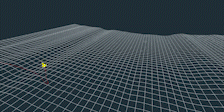An enormous, 58-foot-tall swell that crashed in the waters off British Columbia, Canada, in November 2020 has been confirmed as the largest “rogue” wave ever recorded, according to new research.
The monster wave, which struck off the coast of Vancouver Island, reached a height roughly equivalent to a four-story building, scientists said. Characteristics of the wave were detailed in a study published Feb. 2 in the journal Scientific Reports.
Rogue waves are unusually large swells that occur in open water and grow to more than double the height of other waves in their vicinity. These unpredictable and seemingly random events are sometimes known as “freak” or “killer” waves, and not much is known about how they form.
Johannes Gemmrich, a research scientist at the University of Victoria and the lead author of the study, said that proportional to surrounding waves, the 2020 event was “likely the most extreme rogue wave ever recorded.”
“Only a few rogue waves in high sea states have been observed directly, and nothing of this magnitude,” he said in a statement. “The probability of such an event occurring is once in 1,300 years.”
The huge swell was picked up by sensors on a buoy located a little over 4 miles away from Ucluelet, on the western coast of Vancouver Island.
For centuries, rogue waves were thought to be nautical myths, dismissed as exaggerated accounts cooked up by mariners on the high seas. In recent decades, however, scientists were able to confirm the existence of rogue waves, though they are still difficult to observe and measure.
The first recorded rogue wave occurred off the coast of Norway in 1995. That event, known as the “Draupner wave,” reached a height of nearly 84 feet, twice the size of its surrounding waves. Though the 1995 rogue wave was taller overall than the one measured off Ucluelet, the record-breaking 2020 event was nearly three times the size of other waves around it, the researchers said.
Studying rogue waves could help scientists better understand the forces behind them, and their potential impacts, said Scott Beatty, CEO of MarineLabs, a research company that operates a network of marine sensors and buoys around North America, including the one that recorded the Ucluelet wave.
“The unpredictability of rogue waves, and the sheer power of these ‘walls of water’ can make them incredibly dangerous to marine operations and the public,” he said in a statement.
Beatty added that being able to track and analyze these unusual events will improve maritime safety and help protect coastal communities.
“The potential of predicting rogue waves remains an open question,” he said, “but our data is helping to better understand when, where and how rogue waves form, and the risks that they pose.”
Note: This article have been indexed to our site. We do not claim legitimacy, ownership or copyright of any of the content above. To see the article at original source Click Here














